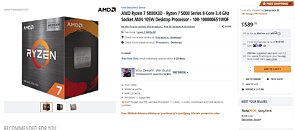
AMD Ryzen 7 5800X3D AM4 Processor Hits End-of-Life
AMD Ryzen 7 5800X3D has hit end-of-life, according to a ComputerBase.de report. Introducing the new 3D V-cache technology, the 5800X3D breathed life back into the Socket AM4 platform as Intel debuted its 12th Gen Core "Alder Lake" processors, while there was still some time to go before AMD could mount up a defense with Ryzen 7000 "Zen 4." AMD figured out a way to augment the 32 MB on-die L3 cache with an additional 64 MB stacked cache that appears as a contiguous 96 MB addressable block to software. Having such a large fast cache next to the CPU cores greatly enhances performance in gaming workloads.
The 5800X3D was able to match the gaming performance of Intel's flagship Core i9-12900K despite being based on the generationally older "Zen 3" microarchitecture, and being restricted with older DDR4 memory. It would go on to be an incredible upgrade option for those still on the Socket AM4 platform, giving them performance in league with Intel's 12th- and 13th Gen processors. As of this writing, US retailer Newegg no longer has the 5800X3D in stock. Amazon has it, and so do some of the smaller retailers. Across the pond, the chip is vanishing from European retailers. In the absence of the 5800X3D, users still have the option of the Ryzen 7 5700X3D and the 6-core 5600X3D, which were both launched in the last year.
The 5800X3D was able to match the gaming performance of Intel's flagship Core i9-12900K despite being based on the generationally older "Zen 3" microarchitecture, and being restricted with older DDR4 memory. It would go on to be an incredible upgrade option for those still on the Socket AM4 platform, giving them performance in league with Intel's 12th- and 13th Gen processors. As of this writing, US retailer Newegg no longer has the 5800X3D in stock. Amazon has it, and so do some of the smaller retailers. Across the pond, the chip is vanishing from European retailers. In the absence of the 5800X3D, users still have the option of the Ryzen 7 5700X3D and the 6-core 5600X3D, which were both launched in the last year.












































